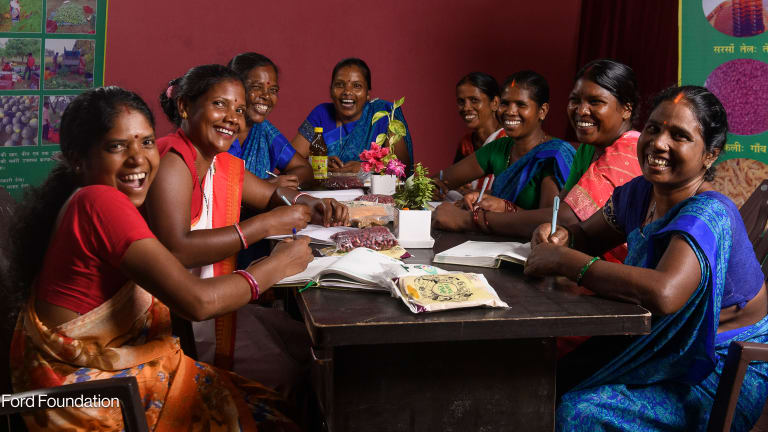
DUBAI — After nearly four decades as a funding organization, one of the world’s largest private foundations, Saudi Arabia-based Alwaleed Philanthropies, is pivoting toward a new strategy that could significantly boost its influence on global programming. The organization has started to actively construct its own partnerships and projects, seeking to shape initiatives around its four year focus area of promoting women and youth.
Speaking exclusively to Devex, Princess Lamia bint Majid Al Saud, secretary general of Alwaleed Philanthropies, shared new details about the size of the foundation’s operations, how they expect to roll out new programs, and what they seek in partners and project proposals.
Alwaleed Philanthropies currently operates 85 programs, totaling roughly $750 million in value, Princess Lamia told Devex in Dubai. Annual operating budgets usually range from $200 to $250 million, although these can rise significantly if the foundation's founder and chair, Prince Alwaleed bin Talal bin Abdulaziz Al Saud, sees a specific urgent need.
Prince Alwaleed in June last year pledged his wealth to the foundation, $32 billion according to Princess Lamia, after signing the “Giving Pledge,” an initiative launched in 2010 by Bill and Melinda Gates and Warren Buffett that urges wealthy individuals to give the majority of their wealth to charity during their lifetimes. Since its founding in 1980, Alwaleed Philanthropies has spent almost $4 billion.
5 things to know about Gulf philanthropy
Foundations in the Gulf are increasingly powerful forces for change in the Middle East. As they expand internationally, they are also on the lookout for blue chip partnerships with the international philanthropic and charitable community. Devex spoke with several organizations and regional experts about what potential partners should know.
Alwaleed Philanthropies will roll out its new strategy in early 2018 at a conference intended to become an annual event for partnering organizations and other international officials. “We’re going to reveal our strategy and our projects — which areas we want to cater [toward]. And we will invite people to send proposals and their ideas,” Princess Lamia said.
The vast majority of the organization’s projects are — and will likely remain — what she calls “synergy projects” that link international expertise and organizations with Saudi capabilities and skills. For example, Alwaleed Philanthropies will partner with UN Women in a forthcoming initiative that will see Saudi women mentors work with female refugees across the globe, according to Princess Lamia.
Alwaleed’s new venture marks a turn toward more activist global philanthropy. The foundation has traditionally funded projects that were already in the works or ready for financing. But after Prince Alwaleed pledged his entire wealth to the charity, the calculus shifted.
“Before this [new] strategy, we were a supporting foundation — a funding source. But I wasn’t satisfied for that,” said Princess Lamia. “I said, I want to create my own projects. I have the best consultants, I have the best team, I have the best researchers, so why not?” Since 2016, the foundation has drawn on U.N. reports, global philanthropic community input, and the expertise of the Saudi community to build initiatives.
The foundation now reviews proposals for partnerships and projects twice a year, in June and November. Princess Lamia said the remit is global, so long as proposals are in line with the foundation’s focus areas. From now until 2020, the primary emphasis is on youth and women’s empowerment.
“The elements of a successful proposal are three things,” she told Devex. First is whether “my team finds it’s well done from a perspective of survey and outcome — we believe in numbers a lot. Second, you highlighted the challenge or the problem clearly. And third, that you are giving a solution that it’s doable ... that can fit the community.”
Opinion: Smallpox eradication strategy should be used for measles, rubella
Four decades later, the same strategy that defeated smallpox can ensure we take a big step to end the misery that measles and rubella cause, writes Princess Lamia Al Saud, the secretary general and member of the board of trustees at Alwaleed Philanthropies, in this guest column.
Community knowledge is particularly important, Princess Lamia said. She urges applicants to “show me in your proposal that you understand the community.” Smaller NGOs and local organizations are particularly welcome, as they are often deeply embedded in the societies and communities in which they work.
After evaluating proposals, Alwaleed Philanthropies vets and evaluates potential partners through a consultancy. The foundation aims to ensure that “there is no intention but to help people,” discluding organizations that might aim to spread a particular belief or ideology to beneficiaries.
Alwaleed Philanthropies currently works with 100 partners in about 160 countries. Among them are “blue chip” agencies, companies and ventures, including UNICEF to combat measles and rubella; the END Fund to eliminate neglected tropical diseases; Bill Gates’ Breakthrough Energy Ventures for renewables; and Habitat for Humanity to support disaster recovery.
The foundation also expects to increase its domestic work inside Saudi Arabia as the country undertakes ambitious economic and social reforms, including the announcement last week that women will be allowed to drive beginning in June 2018. The day after the Royal Decree, Alwaleed Philanthropies announced a joint initiative with Kia Aljabr and Careem, a local ride-sharing company, to train 100 female drivers.
“We’re concentrating on Saudi Arabia a lot, because I think with all that’s happening,” she said, “we have to support heavily.”
Read more international development news online, and subscribe to The Development Newswire to receive the latest from the world’s leading donors and decision-makers — emailed to you free every business day.








